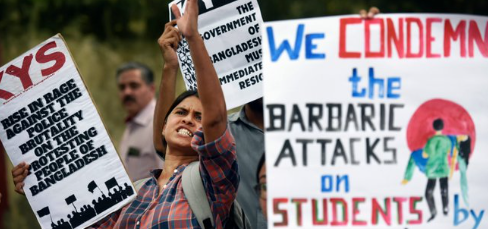In a dramatic turn of events, Bangladesh announced a nationwide curfew set to begin Saturday, amidst a sweeping telecommunications blackout that has severed the nation of 170 million people from the rest of the world. The country is in turmoil as violent clashes between students and security forces intensify.
Faisal Mahmud from Dhaka reported that the army has been deployed across the capital. The government has banned public rallies in Dhaka, where recent clashes have seen buildings torched. Students, enraged over the government job quota system, have ramped up their protests. Before Friday, the violence had already claimed 19 lives, with more casualties reported during Friday’s chaos.
Bangladesh has announced a nationwide curfew. The situation is grim, with 75 people dead. The “so-called” Prime Minister Hasina needs to “step down” promptly to alleviate the unrest.#StepDownSheikhHasina pic.twitter.com/W3QMeBqx7K
— Muhammod Rafsanjani 𝕏 (@RafsanjaniLab) July 19, 2024
Even after the government shut down phone and internet services, the protests morphed, including cyberattacks on government websites. The internet blackout, confirmed by NetBlocks, has plunged the nation into digital silence.
The protests, which began weeks ago, erupted violently this week when student protesters were attacked by the Bangladesh Chhatra League, the student wing of Prime Minister Sheikh Hasina’s Awami League party. The government responded by closing all universities, hoping to quell the unrest, but students defied the orders, leading to heightened tensions.
Thursday saw a deadly escalation as thousands of students clashed with armed police in Dhaka, resulting in 11 deaths, including a bus driver and a student. Various reports suggest differing death tolls, with some claiming up to 39 people were killed throughout the week. The true extent of the casualties remains unverified.
Bangladesh Imposes Curfew, Deploys Military PM Office
Bangladeshi Prime Minister Sheikh Hasina’s office on Friday announced the imposition of a nationwide curfew and the deployment of military forces to keep order after days of deadly student protests.#Bangladesh #Worldnbc pic.twitter.com/xiQu0dMBKY
— World NBC (@WorldNBC1) July 19, 2024
Friday’s violence continued under a suffocating internet blackout. By evening, the government declared a curfew starting at midnight, effectively criminalizing any public gatherings. Authorities accused protesters of widespread vandalism, including attacks on police and government buildings. The state broadcaster, Bangladesh Television, remains offline, and major news sites like The Daily Star and Dhaka Tribune have also been affected. Government websites, including those of the central bank and the prime minister’s office, were reportedly hacked by a group calling itself “THE R3SISTANC3,” which posted anti-government messages online.
The protests are driven by opposition to the job quota system, which reserves more than half of government jobs for specific groups. The unrest ignited after the High Court reinstated a 30 percent quota for descendants of 1971 independence war veterans—a move initially abolished by Hasina in 2018 due to earlier protests. Students argue that the quotas unfairly benefit individuals aligned with the ruling party, especially in a country grappling with high youth unemployment.
Prime Minister Hasina has called for patience, urging students to await the Supreme Court’s ruling on August 7 regarding the government’s appeal against the High Court decision. She has also announced a judicial investigation into the recent violence.
On the same day there was migrant rioting in Leeds, England, protesters also carried out unrelated unrest in Whitechapel, a Muslim and migrant area of London.
The London rioters were attacking in solidarity with riots happening in their country of origin, Bangladesh. pic.twitter.com/hsNREm0IQ4
— Andy Ngô 🏳️🌈 (@MrAndyNgo) July 19, 2024
International reactions have been swift and strong. The U.S. State Department condemned the violence against peaceful protesters, emphasizing the importance of freedom of expression and assembly. U.N. Secretary-General Antonio Guterres called for restraint from all sides and urged collaboration to address the underlying issues. Amnesty International criticized the use of excessive force against student protesters and condemned the death of protester Abu Sayed.
Solidarity has also been shown by international groups, such as the Activists of All India Democratic Students’ Organisation (AIDSO) in New Delhi, who expressed support for the protesting students in Bangladesh.
The dramatic escalation has left the nation on edge, as it grapples with the aftermath of intense violence and the looming curfew. The streets of Dhaka, once bustling with life, now echo with the sounds of protests and clashes, as the government struggles to restore order amidst the chaos.
Major Points
- Bangladesh announced a nationwide curfew and telecommunications blackout amid escalating student protests and violence.
- The protests, fueled by opposition to the government job quota system, have resulted in numerous deaths and significant unrest.
- Despite the government’s efforts to cut off communication, protests have evolved, including cyberattacks on government websites.
- International reactions include condemnations from the U.S. State Department, the U.N., and Amnesty International.
- Solidarity has been expressed by international groups, including student organizations in India.
Conner T – Reprinted with permission of Whatfinger News



